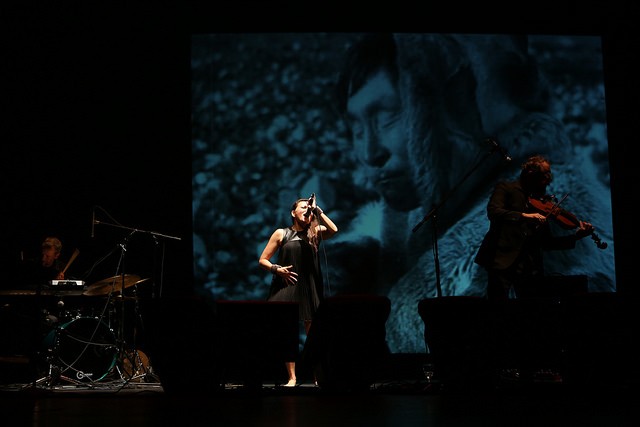
On Friday, PSU’s Lincoln Hall was practically packed, for good reason. Tanya Tagaq, one of Canada’s most esteemed contemporary performers was playing that night. Tagaq specializes in a unique Inuit-influenced style of throat singing. Dressed in a simple but elegant red caped dress, she came onstage barefoot. When she talked, her speaking voice was sweet and generous. She introduced Jean Martin, “who will be doing contemporary drumming,” and Jesse Zubot, “who will be doing contemporary violin,” before pausing and adding wryly, “And I will be doing some contemporary throat singing... Isn’t it funny how indigenous cultures are always expected to be static? And in a museum?”
She let that sink in as Martin and Zubot began to build up the soundscape that would carry them through the night.
This was Tagaq's second time at TBA. Three years ago, she sang live over a screening Nanook of the North, the 1922 “documentary” purporting to capture native life in the Canadian Arctic. Tagaq grew up in Nunavut, an area further north than the Northwest Territories. The soundscape she created for the film was a way to reclaim the stereotypes presented in it while responding and connecting to her Inuk ancestors in the film.
Tonight, though, was all improvisation. Tagaq was clearly excited about that, explaining that each performance was unique and would never be repeated. Tagaq is a master at vocal control. Describing her various intonations wears out one’s thesaurus. Within the space of a moment, she goes from croons and squeaks to fierce bellows and gravelly screeds. She moved to the music, twisting her limbs and crouching down or leaping when necessary.
At times, I was reminded Dohee Lee, whose TBA performance was also a spiraling, unpredictable marriage of movement and sound erupting out of a single human. Tagaq also seemed to travel through different tones and roles; sounds of sex, pain, and joy came in spurts, gurgles, and roars.
Martin’s pounding drums and Zubot’s insistent strings kept time with Tagaq’s gasps and growls. The trio worked in incredible accordance, as in-touch and on-beat as any well-rehearsed act. At times, the buildup was so strong, and Tagaq’s singing so powerful, that it felt like the audience almost wanted the to stop in order to shower them with well-deserved applause.
At one point, Tagaq transitioned into a cover of Nirvana’s “Rape Me.” For this moment, there were no husky grunts or lively twists and turns. Instead, her voice was more melodic, and in a rhythmic tone she let Cobain’s chilling lyrics out over just the scraping sound of Zubot’s violin.
The cover closes her latest album, Retribution, an overtly political work connecting violence against women—specifically native women, who are murdered and go missing at a disproportionately high rate in Canada—and violence toward the earth. Her bleak but beautiful cover is a response to the violations of climate change, capitalism, and neocolonialism against people and the planet.
Then the trio transitioned again, Tagaq aflame in her caped crimson shift once more, taking us on another invigorating, improvised journey.


















